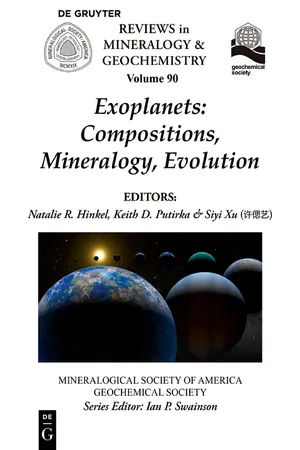
Exoplanets: Compositions, Mineralogy, Evolution
- 612 pages
- English
- PDF
- Available on iOS & Android
Exoplanets: Compositions, Mineralogy, Evolution
About this book
The focus for RiMG volume 90 is on rocky exoplanets because the search for truly Earth-like planets is of special interest. The goal is to motivate communication between the disciplines so as to make the best use possible of existing data and data yet to be collected by the James Webb and the Nancy Grace Roman Space Telescopes, since the astronomy community is gathering data on stars and exoplanets at an accelerating rate. Such data now include exoplanet size and mass (i.e., density) as well as their atmospheric compositions, which are collectively telltale of mineralogy and evolution. Much of what is published may still fall in the realm of educated speculation, but our conjectures are metamorphosing into testable hypotheses.
There is now a remarkably large amount of astronomical data (with even more on the way) that geochemists and petrologists can make much use of. But just as astronomers may benefit from geologic insights, geologists need our colleagues in astronomy to help interpret their data and their underlying implications to better understand its astronomical context. Our hopes for this volume will be fulfilled if readers initiate their own analyses of what at present may seem like novel or unusual data, and if new collaborations between academic departments and subfields are forged.
Tools to learn more effectively

Saving Books

Keyword Search

Annotating Text

Listen to it instead
Information
Table of contents
- DEDICATION
- PREFACE
- TABLE OF CONTENTS
- 1 Host Stars and How Their Compositions Influence Exoplanets
- 2 Chemistry in Protoplanetary Disks
- 3 Planet Formation—Observational Constraints, Physical Processes, and Compositional Patterns
- 4 Meteorites and Planet Formation
- 5 The Evolution and Delivery of Rocky Extra-Solar Materials to White Dwarfs
- 6 The Chemistry of Extra-solar Materials from White Dwarf Planetary Systems
- 7 Exoplanet Mineralogy
- 8 From Stars to Diverse Mantles, Melts, Crusts, and Atmospheres of Rocky Exoplanets
- 9 Some Tectonic Concepts Relevant to the Study of Rocky Exoplanets
- 10 A Framework for the Origin and Deep Cycles of Volatiles in Rocky Exoplanets
- 11 Exoplanet Magnetic Fields
- 12 Transiting Exoplanet Atmospheres in the Era of JWST
- 13 An Overview of Exoplanet Biosignatures
- 14 The Early Earth as an Analogue for Exoplanetary Biogeochemistry
- 15 Exoplanet Geology: What Can We Learn from Current and Future Observations?
Frequently asked questions
- Essential is ideal for learners and professionals who enjoy exploring a wide range of subjects. Access the Essential Library with 800,000+ trusted titles and best-sellers across business, personal growth, and the humanities. Includes unlimited reading time and Standard Read Aloud voice.
- Complete: Perfect for advanced learners and researchers needing full, unrestricted access. Unlock 1.4M+ books across hundreds of subjects, including academic and specialized titles. The Complete Plan also includes advanced features like Premium Read Aloud and Research Assistant.
Please note we cannot support devices running on iOS 13 and Android 7 or earlier. Learn more about using the app